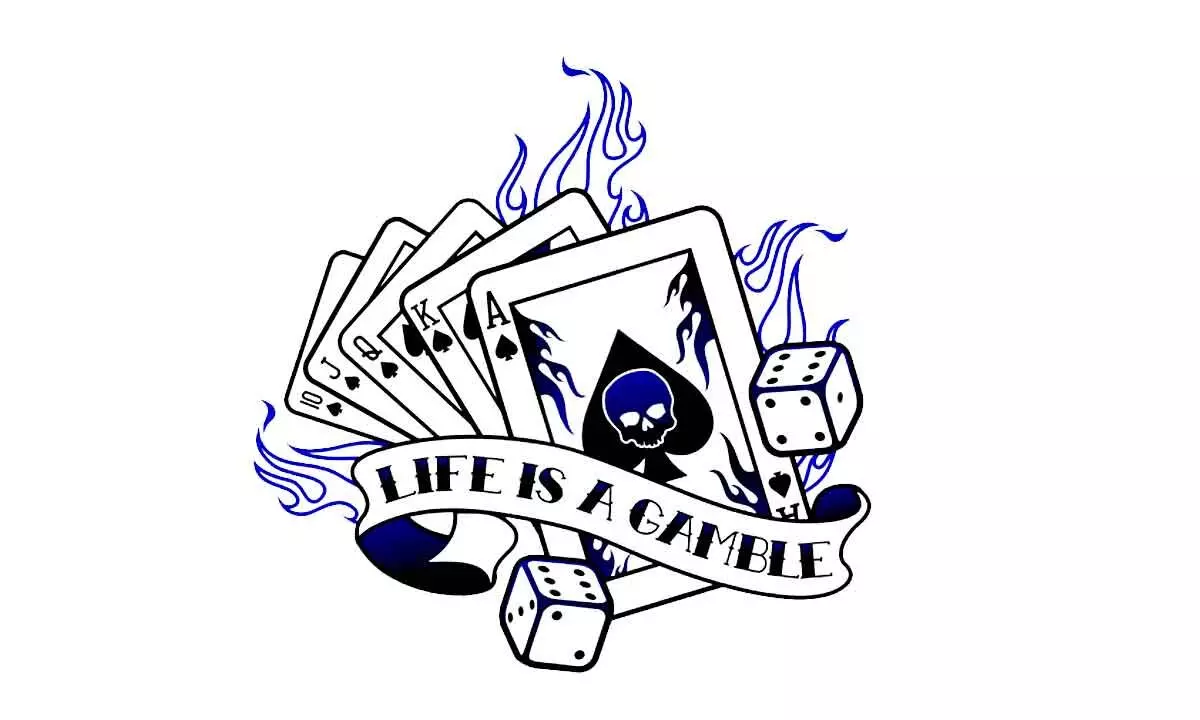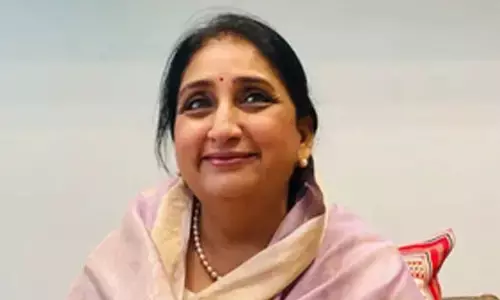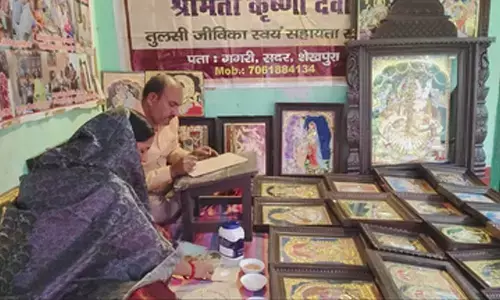When To Play And When To Quit

The attitude of governments towards gambling varies across countries. Countries such as United Kingdom, USA, China, Australia, and Thailand, are major markets gambling. In India, however, it is forbidden. The legality of the law banning gambling, in so far as it pertains to the card, game of rummy, was once questioned in the Supreme Court. And the court held that as the game was a game of skill, and not chance, it did not come within the definition of gambling. The advent of online gaming, which is not mentioned in the statute prohibiting gambling, has, however, complicated matters, and courts now need to decide on the legality of it on a case-by-case basis… The best throw of the dice is to throw them away
The urge to gamble, I am afraid, runs in our family. My father was a keen punter who loved to go to the race course wherever he happened to be, whether it was Hyderabad where we lived, as also Bangalore, Mumbai or Delhi, if he was an on a visit to those places. He would spend the whole week studying, the ‘Original Vel’, a racing guide, scrutinising the histories of the various horses and their jockeys.
Come the following Sunday, he would carry precisely ₹ 150 to the races, and invariably, end up, losing every rupee that he carried with him! My brother, likewise, was an ardent player of cards at the local club, wherever he was posted, such as at Rajahmundry and Nepa Nagar. I am rather fond of card games, myself, but only in the company of friends and cousins. The sessions begin with the solemn resolve of playing nothing but rummy, but invariably end up with ‘Teen Patti’, the Indian three card equivalent, in India, of poker.
In the 1952 Donald Duck comic, ‘Flip Decision’, Donald meets Professor Batty, who persuades Donald to make decisions based on a pseudophilosophy, known as ‘flipism’, or flipping a coin at every crossroad of life, and to deciding on the next course of action, saying “Life is a gamble! Let flipism chart your ramble!”
As an illustration of Batty’s wise counsel, consider child birth. The chances, of the very conception of a baby, are extremely given the numbers of spermotazoa, and ova, involved in the creation of a zygote. It is, thus, a great boon, at all to be born. To survive, thereafter, and become a healthy, and educated, adult, with a decent job and a family to boot, is no small a gift. A gift the value of which many of us fail to appreciate.
I was born a premature baby, in the seventh month of my mother’s. And in 1945, when incubators, or antibiotics, had hardly been heard of! But for the unimaginably patient, and affectionate, care taken by my mother, and her brother, then studying medicine, I should not have survived at all. I had no skin, including over the skull, and often turned blue. They often had to slap me hard to get the blood circulation going and, on occasion, even give me a shot of brandy, perhaps the one good thing they did, that has survived as a habit, till today! Therefore, I feel that when to be alive itself is a miracle, there can be no room for regret or disappointment. As the lyrics of the song go, in the Hindi movie of 1971 vintage ‘Andaz’, “Zindagi Ek Safar Suhana Yahan Kal Kya Ho Kisne Jana.”
When I was entering my career, my father gave me life counsel. “Be happy”. I cannot say I have fully understood the import of his advice, even till today. But I remain a happy person. Often miserable, the prone to the occasional temperamental tantrum, yes. But unhappy deep within? No I am a staunch subscriber to the philosophy professed by Dale Carnegie, in his book, ‘How to Stop Worrying and Start Living’. And have consciously developed a deep sense of ‘la joie de vivre’ or the zest for life.
I remember how, as an undergraduate student in the Hindu college at Delhi in the 1960s, my friend Rajan, and, I would stand under a street lamp, toss a coin and gamble on the result, when we had run out of every other means of feeding our gambling instinct!
The gambling streak has, apparently, been bequeathed to the next generation too. My brother was once showing his two-year-old son a newspaper advertisement. Much like the warrior Arjun in the Hindu epic, Mahabharat, eyes would see nothing but the eyeball in the eye of the parrot, which his Guru Dronacharya wanted him to shoot, my nephew’s eyes ignored the rest of the advertisement, only focusing on the pictures of playing cards, in the corners of, the border of the advertisement!
Generally speaking, playing card games, with a modest stake, is a harmless form of entertainment, especially in the company of friends and relatives. In fact, at the time of the popular festival of Diwali in India, gambling is regarded almost as a sacred ritual! It is only when it becomes a business and innocent people are beguiled, into betting illegally, especially on cricket matches, that the scourge entails dangerous consequences.
So is the case with the share markets. When bullish and bearish trends are not the result of the play of market forces, but the consequence of the ulterior motives of racketeers, a normally innocuous source of income becomes a pernicious addiction, capable of leading to financial ruin. How the combination of greed and avarice, coupled with a weakness for gambling, can lead to catastrophe, was best illustrated by the most unfortunate 1992 Indian stock market scam, in which unscrupulous elements with the active, if not enthusiastic, support of dishonest bankers and corrupt politicians, manipulated the Bombay Stock Exchange. Not only was the stock market disrupted, but over 10 million investors were defrauded.
The attitude of governments towards gambling varies across countries. Countries such as United Kingdom, USA, China, Australia, and Thailand, are major markets gambling. In India, however, it is forbidden. The legality of the law banning gambling, in so far as it pertains to the card, game of rummy, was once questioned in the Supreme Court. And the court held that as the game was a game of skill, and not chance, it did not come within the definition of gambling. The advent of online gaming, which is not mentioned in the statute prohibiting gambling, has, however, complicated matters, and courts now need to decide on the legality of it on a case-by-case basis.
Gambling has been a favoured pastime from times immemorial. Even in the epic Mahabharat, Yudhishthir, the eldest of the Pandava Princes, is depicted as being very fond of the game of dice. The Kaurava Crown Prince Duryodhana attends, on invitation, a Yagna called the ‘Rajasuya’, performed by the Pandava King Yudhishthir. He faces humiliation during a visit to a grand House of Miracles, built by the Pandavas, called ‘Maya Sabha’. Consumed by the desire for revenge and retaliation, Duryodhana plans a game of dice with Yudhishthir, an idea which is vehemently opposed by Bhishma, the patriarch of the Kaurava clan. Adamant Duryodhana, however, goes through with it, encouraged enthusiastically by his cunning uncle Shakuni, who has a loaded pair of dice, the numbers on which will always be whatever Shakuni wants. And, though aware of this, time after time, Yudhishthir stakes his wealth and, time after time, Duryodhana wins. Eventually, Yudhishthir loses his jewels, his gold, his silver, his army, his chariot, his horses, his slaves, his kingdom, his brothers and, ultimately, even his wife, Draupadi.
In more recent times, such as in the Elizabethan era, gambling was so much ingrained, within the English consciousness that its mention is made frequently in the works of the immortal William Shakespeare.
Even the Holy Qur’an refers to games of chance or ‘maisir’, calling them ‘abominations of Satan’s handiwork’. The ‘Hadith’ which contain the details of Islamic law, calls, wine, and gambling as things in which lies “grave sin …….to mankind.”
The Holy Bible, on the other hand, while not calling gambling a sin, as such, warns against the love of money and get- rich -quick schemes.
The moral of the story, therefore, is that the best throw of the dice is to throw them away!
To end on a lighthearted note, here is something I heard. When someone asked what the difference was between casino players and politicians, the response was that casino players tell the truth, at least, sometimes!
(The writer was formerly Chief Secretary, Government of Andhra Pradesh)

















